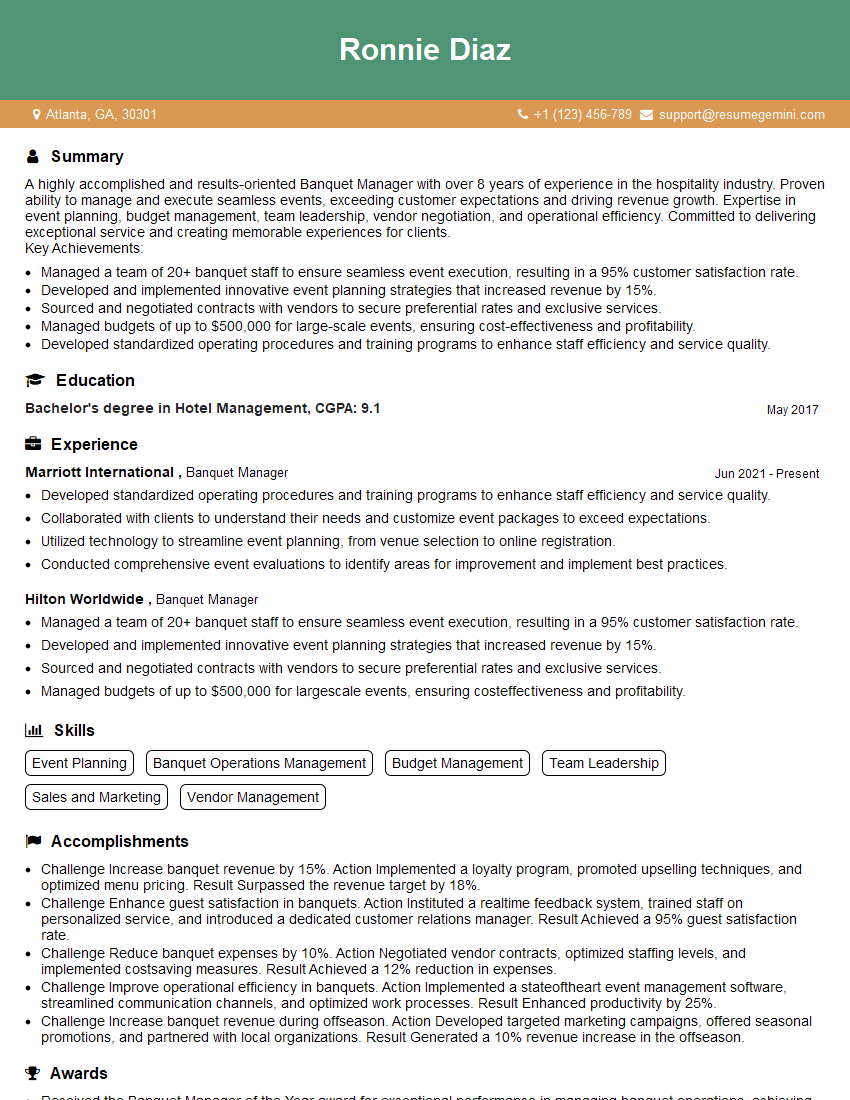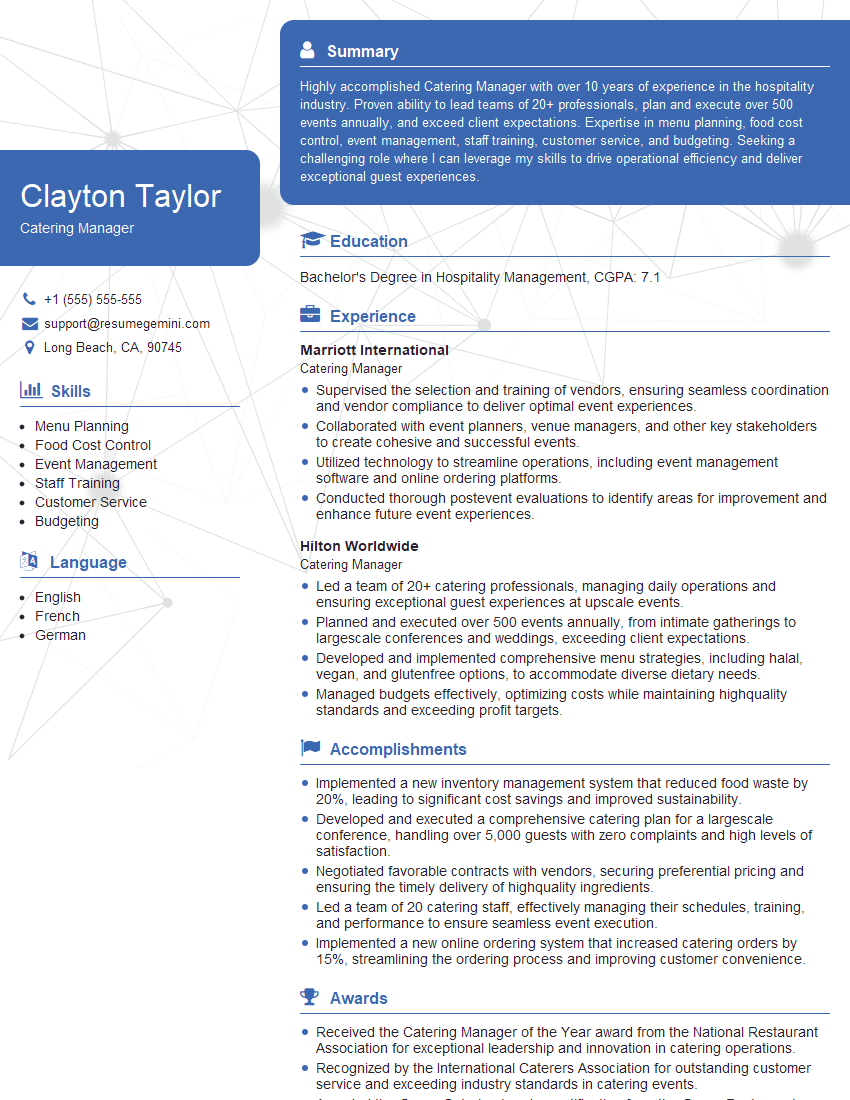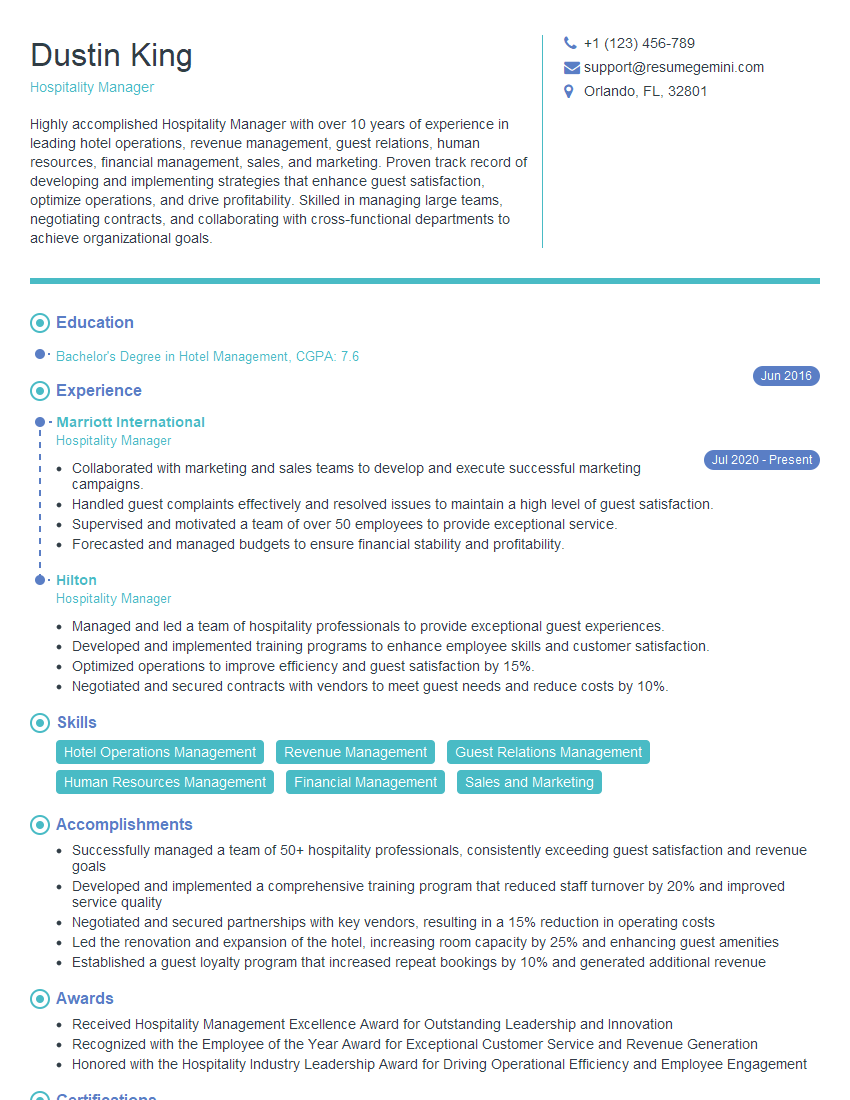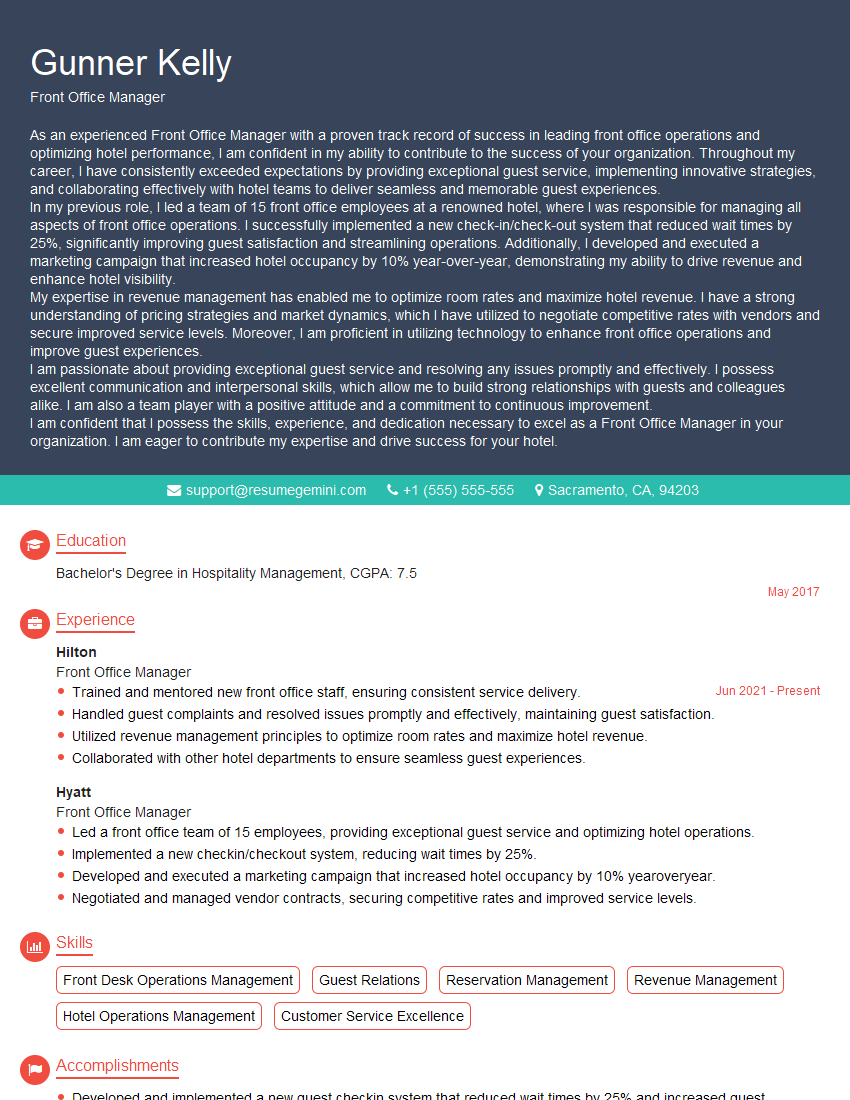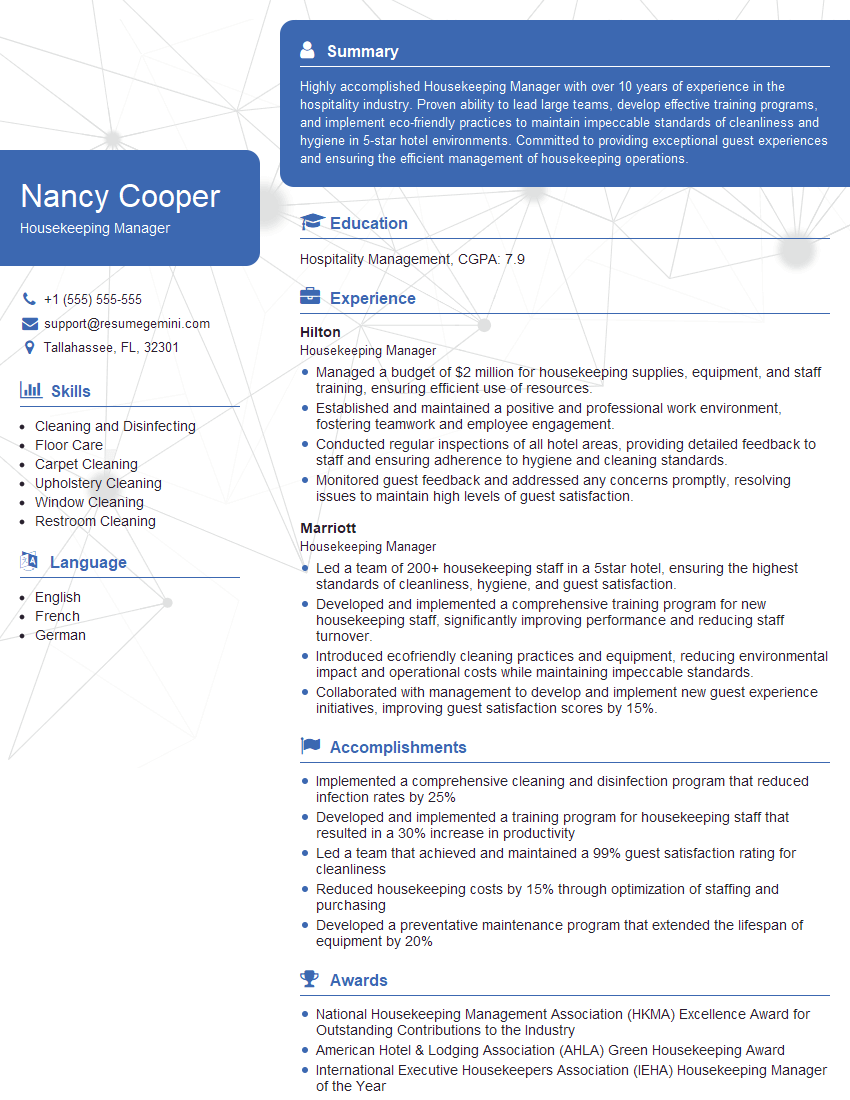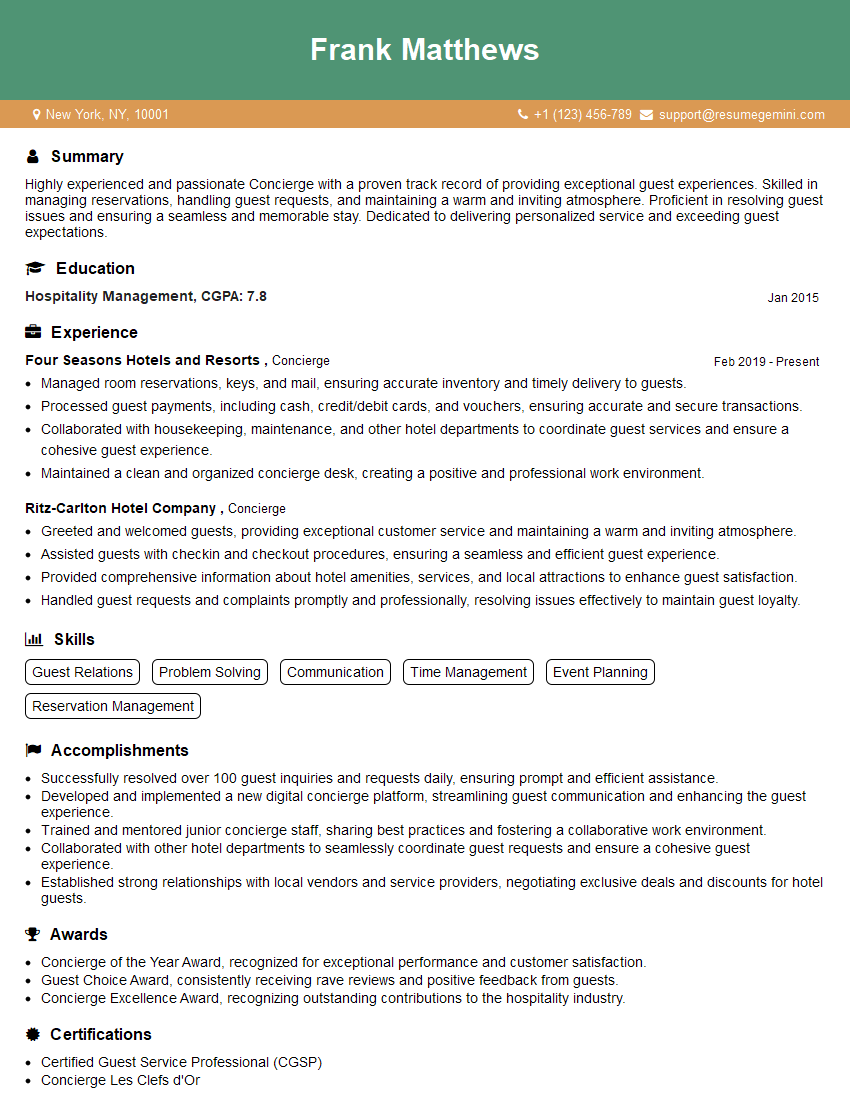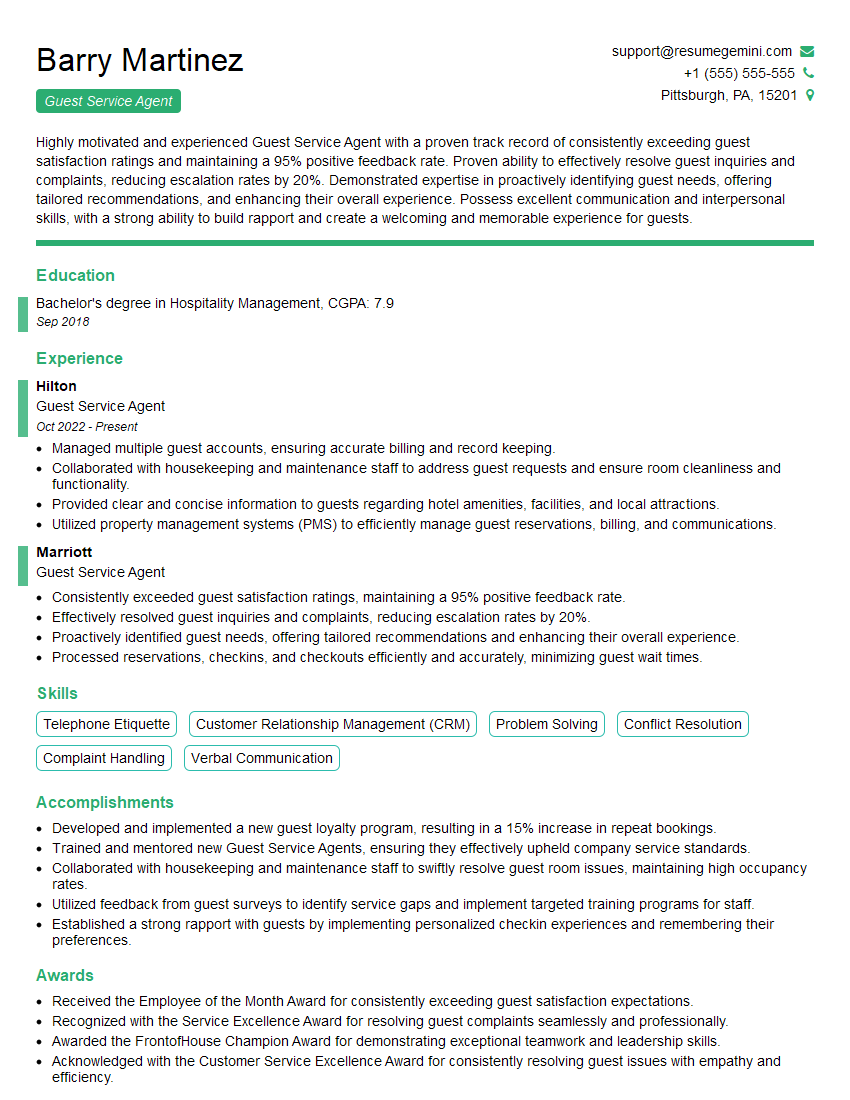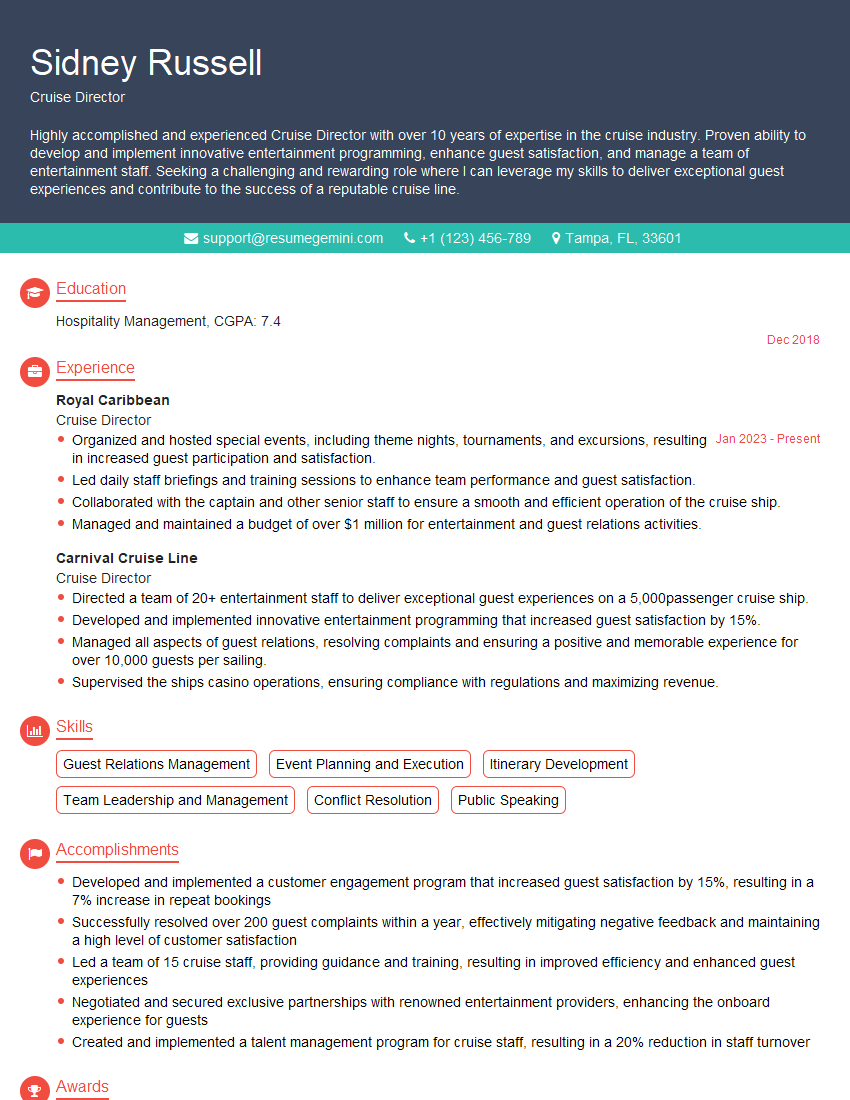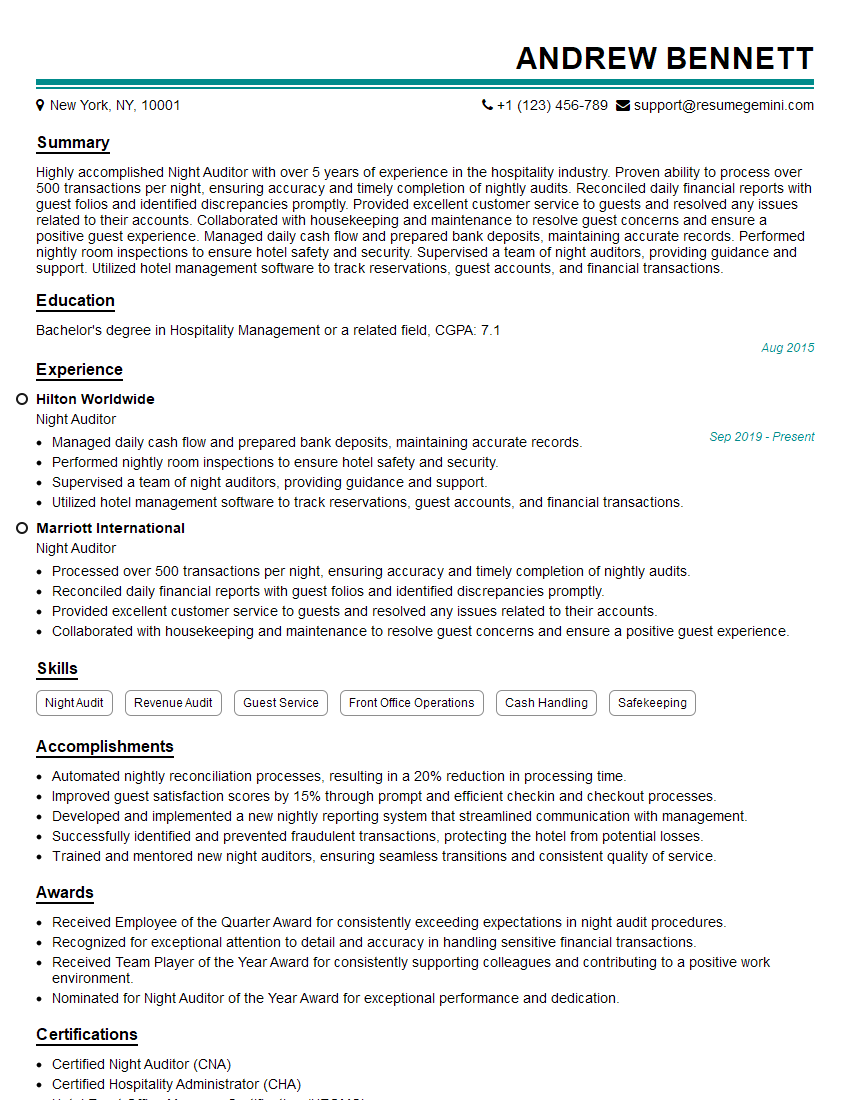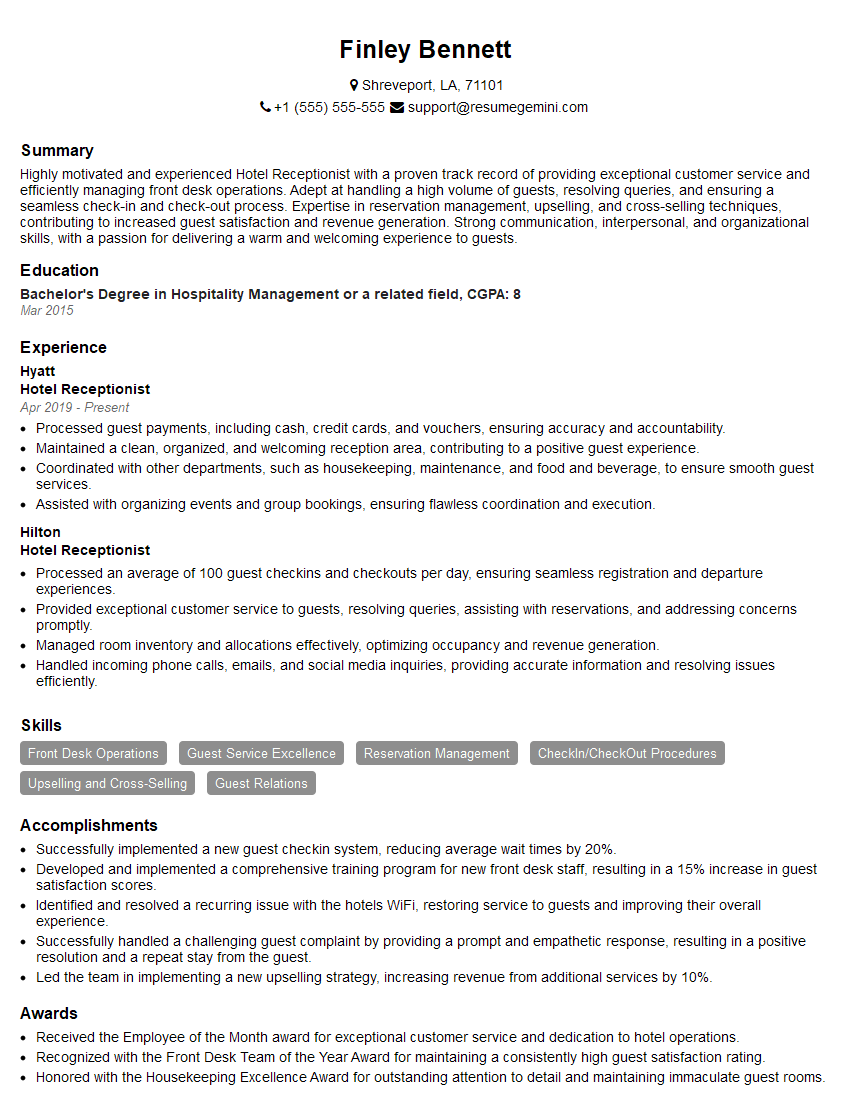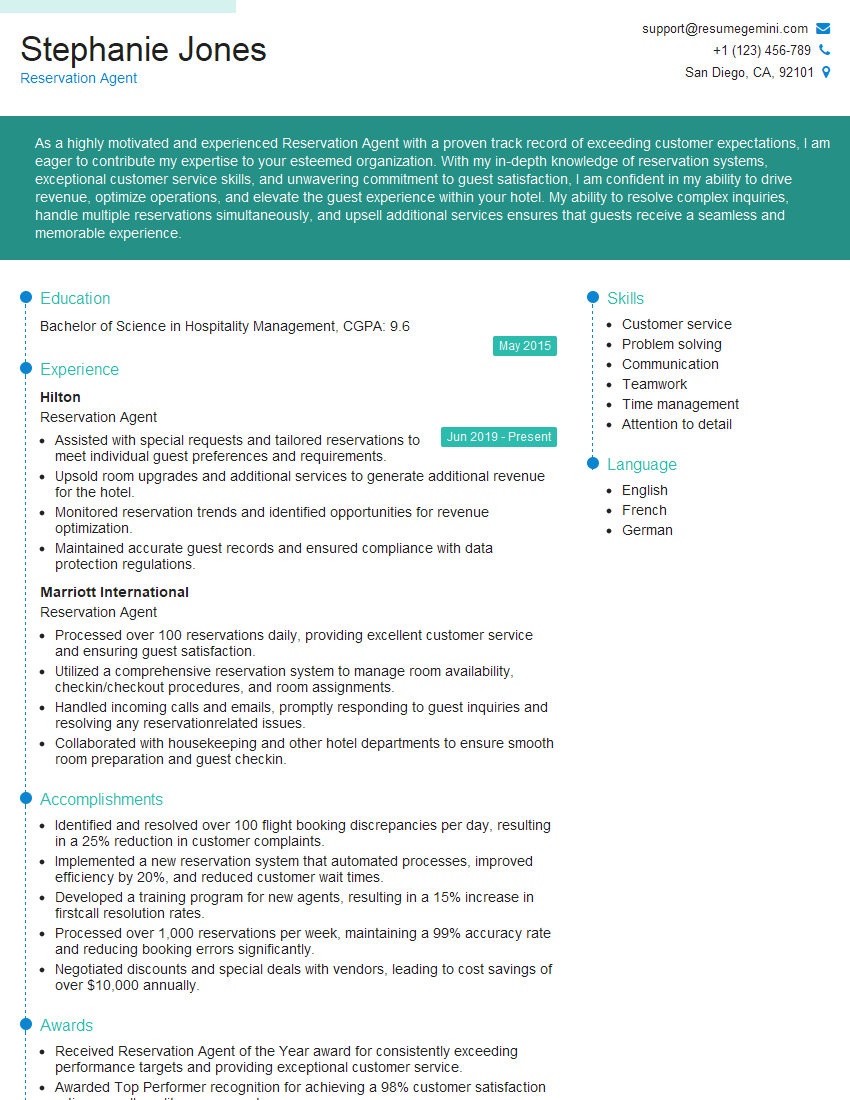Cracking a skill-specific interview, like one for Guest Relations and Hospitality, requires understanding the nuances of the role. In this blog, we present the questions you’re most likely to encounter, along with insights into how to answer them effectively. Let’s ensure you’re ready to make a strong impression.
Questions Asked in Guest Relations and Hospitality Interview
Q 1. Describe your experience handling guest complaints.
Handling guest complaints is a crucial aspect of guest relations. My approach focuses on active listening, empathy, and efficient problem-solving. I always begin by letting the guest express their concerns fully without interruption, ensuring they feel heard and understood. This involves making eye contact, nodding, and using verbal affirmations like “I understand” or “I see.”
Once the complaint is understood, I clarify the issue by asking clarifying questions to avoid misinterpretations. For example, if a guest complains about a noisy room, I’d ask about the specific times of the noise and its nature. Then, I apologize sincerely, regardless of fault, as acknowledging their dissatisfaction is paramount.
Next, I propose solutions, offering options tailored to the situation. If the issue is a noisy room, I’d offer a room change, earplugs, or a discount. I always follow up to ensure the issue is resolved and the guest is satisfied. I document every interaction, including the complaint, my response, and the resolution, ensuring consistency and accountability. For instance, in one case, a guest complained about a malfunctioning coffee maker. After a technician fixed it, I followed up with a small gift basket as a gesture of goodwill.
Q 2. How do you prioritize tasks during peak hours?
Prioritizing tasks during peak hours requires a systematic approach. I utilize a combination of techniques, including time management matrices (like Eisenhower Matrix), to categorize tasks by urgency and importance. This ensures that critical tasks, such as addressing immediate guest needs or resolving urgent issues, are tackled first.
I also utilize a queuing system, both mental and sometimes physical, to manage incoming requests. This allows me to attend to guests in a fair and efficient manner, avoiding feeling overwhelmed. Furthermore, I leverage technology where possible, using property management systems (PMS) to track guest requests, reservations, and maintenance needs. This provides a clear overview of tasks and their status, enabling better organization and efficient allocation of time. Finally, effective communication with colleagues is essential, allowing us to share workloads and provide support where needed. During a busy check-in, for example, I’ll quickly assess which tasks need immediate attention—like assisting guests with disabilities or those with urgent needs—while delegating less urgent requests to colleagues.
Q 3. Explain your approach to conflict resolution with dissatisfied guests.
My approach to conflict resolution emphasizes empathy, active listening, and finding mutually acceptable solutions. I begin by actively listening to the guest’s concerns, acknowledging their feelings and validating their experience. I then calmly explain the situation from the hotel’s perspective, ensuring clear and transparent communication. The goal isn’t to win an argument, but to find a resolution that leaves both parties feeling heard and respected.
I use a collaborative problem-solving approach, working with the guest to brainstorm potential solutions. This often involves offering choices and compromises, empowering the guest to feel in control of the outcome. For instance, if a guest is unhappy with their room upgrade, I might offer them alternative options, such as a complimentary spa treatment or dining credit. Throughout the process, I maintain a calm and professional demeanor, avoiding defensiveness or escalation. I follow up after the resolution, checking in with the guest to ensure their satisfaction and gather feedback for future improvements.
Q 4. What software or systems are you proficient in for guest management?
I am proficient in several guest management systems, including Opera PMS (Oracle Hospitality OPERA Property Management System), Guestline Rezlynx, and Cloudbeds. My experience with these systems extends to managing reservations, guest profiles, tracking requests and complaints, generating reports, and managing revenue. I am comfortable using these systems to efficiently manage guest information, ensuring accuracy and ease of access for staff.
Beyond PMS, I have experience using CRM (Customer Relationship Management) software to manage guest interactions, track preferences, and personalize communication. I can also utilize various communication platforms such as email marketing systems and social media management tools to communicate with guests effectively. Finally, I’m proficient in Microsoft Office Suite, including Excel, which I utilize for data analysis and reporting.
Q 5. How do you maintain a positive attitude when dealing with demanding guests?
Maintaining a positive attitude when dealing with demanding guests is a skill honed through experience and self-awareness. I understand that a guest’s frustration is often not directly aimed at me, but rather a reflection of their own circumstances or unmet expectations. Therefore, I choose to see their behavior not as a personal attack but as an opportunity to showcase my professionalism and problem-solving skills.
I employ several techniques to maintain positivity. I focus on active listening and empathy, seeking to understand the root of their complaint. I utilize positive self-talk, reminding myself of my abilities and the value I bring. I also take short breaks when necessary to de-stress and avoid burnout. Moreover, I practice mindfulness and stress-reduction techniques. Finally, I celebrate small victories, acknowledging the positive outcomes of successfully resolving even the most challenging interactions.
Q 6. Describe your experience with guest follow-up and feedback.
Guest follow-up and feedback are essential for continuous improvement. After resolving a guest complaint or interaction, I always follow up to ensure their satisfaction. This might involve a phone call, email, or a handwritten note, depending on the situation and the guest’s preference. I use these follow-ups as an opportunity to gather feedback on their overall experience and identify areas where the hotel can improve.
I actively solicit feedback through various channels, including online review platforms and guest satisfaction surveys. I analyze this feedback meticulously, identifying trends and patterns that highlight areas for improvement. For instance, recurring complaints about slow Wi-Fi might prompt an investigation and upgrade of the hotel’s internet infrastructure. This data-driven approach ensures our efforts are focused on truly enhancing the guest experience. I regularly report my findings and recommendations to management to inform strategic decision-making.
Q 7. How would you handle a situation where a guest has lost their belongings?
Handling a lost-belongings situation requires a calm and efficient approach. First, I express empathy and understanding, acknowledging the guest’s distress. Then, I initiate a thorough search, starting with the immediate area—the room, the lobby, and any public spaces where the guest might have last had the item. I will involve housekeeping and security staff as needed to widen the search.
Next, I review security camera footage if available, to potentially trace the item’s whereabouts. I document all steps taken, including the time, location, and individuals involved. If the item is found, I ensure its safe return to the guest, and if not, I begin the process of filing a lost and found report. I advise the guest on the procedures involved, which might include filling out a claim form and providing a detailed description of the lost item. In cases of significant value, I involve the relevant authorities and insurance company if necessary. Throughout the process, I strive to keep the guest updated and informed, providing regular communication to reassure them and minimize their anxiety.
Q 8. What is your understanding of different guest service styles?
Guest service styles vary greatly depending on the establishment’s brand, target audience, and overall atmosphere. Some common styles include:
- Formal/Traditional: This style emphasizes formality, politeness, and adherence to established protocols. Think of a five-star hotel with highly trained staff using formal language and precise service procedures.
- Informal/Casual: This approach is more relaxed and friendly, focusing on creating a welcoming and comfortable environment. A boutique hotel or a bed and breakfast might adopt this style, prioritizing personal interaction over rigid formality.
- Personalized/Concierge: This focuses on anticipating individual guest needs and providing customized experiences. This often involves proactively addressing guest preferences and offering bespoke services, common in luxury hotels and high-end resorts.
- Efficient/Functional: Prioritizes speed and efficiency, often seen in budget hotels or those with high guest turnover. While polite, the focus is on swift and effective service delivery.
Understanding these styles helps in adapting one’s approach to meet the specific expectations of the guest and the establishment’s brand identity. For example, in a formal setting, a simple ‘Good morning, sir/madam’ is preferred over a casual ‘Hey there!’
Q 9. How do you ensure guest satisfaction and loyalty?
Ensuring guest satisfaction and loyalty requires a multi-faceted approach that goes beyond simply providing the basics. It’s about exceeding expectations and creating memorable experiences.
- Proactive Service: Anticipating guest needs before they are voiced (e.g., offering assistance with luggage, providing extra towels without being asked).
- Personalized Attention: Remembering guest preferences and using their names whenever possible shows you value them as individuals.
- Effective Communication: Clear, concise, and friendly communication is crucial. Addressing concerns promptly and empathetically is key.
- Problem Resolution: When issues arise, handle them swiftly and efficiently, offering sincere apologies and appropriate compensation. Turning a negative experience into a positive one can foster loyalty.
- Feedback Mechanisms: Actively soliciting and acting upon guest feedback demonstrates a commitment to improvement and shows you value their opinions.
- Loyalty Programs: Offering rewards and exclusive benefits to repeat guests incentivizes future stays and fosters long-term loyalty.
For example, remembering a regular guest’s favorite drink and having it ready upon their arrival significantly enhances their experience and reinforces their loyalty.
Q 10. Explain your experience with upselling and cross-selling products or services.
Upselling and cross-selling are valuable tools for increasing revenue and enhancing the guest experience, provided they are done ethically and naturally.
Upselling involves suggesting a higher-priced option to the guest’s initial choice (e.g., upgrading a standard room to a suite). Cross-selling involves suggesting related products or services to complement the guest’s existing purchase (e.g., recommending a spa treatment to a guest who has booked a room).
My experience includes suggesting suite upgrades highlighting the added amenities, such as a better view or a private balcony. I’ve also successfully cross-sold spa treatments, airport transfers, and restaurant reservations by showcasing the unique benefits and connecting them to the guest’s overall travel plans. The key is to present these options as ways to improve their stay and not as mere sales pitches. For example, instead of saying ‘Would you like to upgrade?’, I’d say ‘Considering your stay is for a special occasion, might I suggest our premium suite with a stunning ocean view?’ This demonstrates care and avoids a pushy sales approach.
Q 11. How do you adapt to different guest needs and preferences?
Adapting to different guest needs and preferences is fundamental to excellent guest service. This requires strong observation skills, active listening, and empathy.
- Observation: Paying close attention to a guest’s behavior, body language, and spoken preferences (e.g., dietary restrictions, mobility issues).
- Active Listening: Not just hearing what the guest says but understanding their needs and concerns.
- Empathy: Putting oneself in the guest’s shoes and understanding their perspective.
- Customization: Tailoring services and offerings to meet individual needs (e.g., providing accessible rooms, catering to dietary requirements).
For instance, if a guest appears stressed or overwhelmed, offering a calming beverage or suggesting a quiet area can significantly improve their experience. If a guest mentions a mobility issue, I would immediately offer assistance and ensure their room is conveniently located.
Q 12. How do you handle situations involving safety or security concerns?
Handling safety or security concerns requires prompt, calm, and decisive action. Prioritizing guest safety is paramount.
- Immediate Response: Address the situation promptly, following established safety protocols.
- Assessment: Assess the nature of the concern and determine the appropriate course of action.
- Guest Safety: Ensuring the guest’s safety and well-being is the top priority.
- Notification: Contacting relevant authorities (e.g., security personnel, emergency services) as needed.
- Documentation: Thoroughly documenting the incident and the actions taken.
For example, if a guest reports a suspicious individual, I’d immediately notify security and assist the guest to a safe location. I’d also document the incident, including the guest’s description, the time of the report, and the actions taken by security personnel.
Q 13. Describe your experience with reservations and check-in/check-out procedures.
My experience with reservations and check-in/check-out procedures is extensive. I am proficient in using various reservation systems, handling guest inquiries, and ensuring a smooth check-in/check-out process.
- Reservation Management: Handling reservations via phone, email, or online platforms, confirming details, and addressing guest inquiries.
- Check-in: Welcoming guests, verifying their details, providing room keys, and explaining hotel amenities and services.
- Check-out: Processing payments, verifying bills, addressing any outstanding issues, and ensuring a pleasant departure experience.
- Problem Solving: Addressing reservation issues, handling late check-outs, or resolving billing discrepancies.
For instance, I’ve successfully managed several overbooked situations by proactively contacting guests with alternative arrangements, ensuring minimal disruption to their travel plans. I am also adept at handling various payment methods and resolving any billing discrepancies quickly and efficiently.
Q 14. What is your experience with managing guest expectations?
Managing guest expectations is crucial for preventing disappointment and fostering positive experiences. It’s about setting realistic expectations and consistently delivering on promises.
- Clear Communication: Providing accurate and detailed information about hotel services, amenities, and policies.
- Realistic Expectations: Avoiding over-promising and managing guest expectations honestly.
- Proactive Problem Solving: Addressing potential issues before they escalate.
- Follow-through: Ensuring that promises made are kept.
For example, if a guest has specific requests (e.g., a particular room view), I would confirm the availability before confirming the booking to avoid disappointment. If there is a temporary disruption in service, I would inform the guest proactively, explaining the situation and outlining the steps being taken to resolve it. Open communication prevents surprises and strengthens trust.
Q 15. How would you deal with a guest who is intoxicated or disruptive?
Dealing with an intoxicated or disruptive guest requires a calm, firm, and safety-focused approach. My priority is always the safety and well-being of all guests and staff. I would first assess the situation, ensuring my own safety and the safety of others. If the guest poses an immediate threat, I would immediately contact security or the appropriate emergency services.
For less severe situations, I would approach the guest with empathy and understanding, attempting to de-escalate the situation through calm and respectful communication. I’d listen to their concerns, validate their feelings (without condoning disruptive behavior), and offer assistance or solutions where possible. For example, if they’re intoxicated, I might offer them water or a place to rest. If they are being disruptive due to a misunderstanding, I would clarify the situation. If the behavior continues despite my efforts, I would involve management and security to ensure the safety and comfort of all guests.
Documentation is crucial. I would meticulously document the incident, including the time, date, guest details (if available), the nature of the disruption, actions taken, and the outcome. This documentation serves as a record for future reference and can be vital in preventing similar incidents.
Career Expert Tips:
- Ace those interviews! Prepare effectively by reviewing the Top 50 Most Common Interview Questions on ResumeGemini.
- Navigate your job search with confidence! Explore a wide range of Career Tips on ResumeGemini. Learn about common challenges and recommendations to overcome them.
- Craft the perfect resume! Master the Art of Resume Writing with ResumeGemini’s guide. Showcase your unique qualifications and achievements effectively.
- Don’t miss out on holiday savings! Build your dream resume with ResumeGemini’s ATS optimized templates.
Q 16. What strategies do you use to build rapport with guests?
Building rapport with guests is fundamental to exceptional guest relations. It’s about creating a genuine connection that makes guests feel valued and comfortable. My strategy is multifaceted and begins even before a guest arrives. For example, a personalized welcome message before their check-in or a pre-arrival email with local information can set the tone.
During the interaction, I focus on active listening, showing genuine interest in their needs and preferences. I use their name, make eye contact, and pay attention to their body language. I aim for authentic conversations, not just transactional interactions. A simple question like, “How was your journey?” or “What are you hoping to do during your stay?” can open up a conversation and show I care.
I also anticipate their needs. If I see a guest struggling with their luggage, I offer assistance. If they seem lost or unsure, I provide directions and guidance. These small gestures demonstrate thoughtfulness and build trust, creating a positive experience that fosters a lasting connection.
Q 17. How do you utilize technology to improve guest services?
Technology plays a crucial role in enhancing guest services. We use a Customer Relationship Management (CRM) system to store and access guest preferences, past experiences, and communication history. This enables personalized service; for example, knowing a guest prefers a specific room type or has dietary restrictions allows us to proactively cater to their needs.
Online booking systems and mobile check-in/check-out streamline the arrival and departure processes, saving guests time and improving their overall experience. Guest communication tools like SMS and in-app messaging allow for instant responses to queries and requests, enhancing responsiveness and convenience.
Furthermore, online feedback platforms provide valuable data on guest satisfaction. Analyzing this data helps us identify areas for improvement and implement changes to enhance guest experiences proactively. For example, if multiple guests mention issues with the Wi-Fi, we can address it promptly.
Q 18. What are the key performance indicators (KPIs) for guest relations?
Key Performance Indicators (KPIs) for guest relations are essential for measuring success and identifying areas for improvement. Some crucial KPIs include:
- Guest Satisfaction Scores (e.g., through surveys): This measures overall guest happiness and provides valuable feedback.
- Net Promoter Score (NPS): This gauge measures the likelihood of guests recommending the establishment to others.
- Average Handling Time (AHT): This measures the efficiency of resolving guest issues.
- Resolution Rate: This tracks the percentage of guest issues resolved successfully.
- Customer Churn Rate: This indicates the rate at which guests choose not to return.
- Social Media Mentions and Reviews: Monitoring online platforms provides insights into guest sentiment.
By tracking these KPIs, we can identify trends, measure the effectiveness of our strategies, and make data-driven decisions to enhance the overall guest experience.
Q 19. How do you identify and address potential guest service issues proactively?
Proactive identification and addressing of potential guest service issues is vital for preventing negative experiences. This involves anticipating potential problems based on past experiences, guest feedback, and industry trends.
For example, if a particular room type frequently receives complaints about noise, I might proactively offer guests in that room earplugs or alternative accommodations. We might also implement regular preventative maintenance to minimize issues like elevator malfunctions or plumbing problems.
Regular staff training on anticipating and resolving potential problems is crucial. For instance, training staff to recognize signs of a guest who might be having a difficult time and approaching them proactively to offer assistance can significantly improve the guest experience.
Monitoring online reviews and social media for mentions of potential issues can help us identify problems before they escalate. Regularly surveying guests, even after a positive experience, allows us to pinpoint minor issues that might otherwise go unnoticed.
Q 20. Describe your experience with providing multilingual guest services.
I have extensive experience providing multilingual guest services. In my previous role, I was regularly involved in assisting guests from various backgrounds, and I am proficient in [List languages – e.g., Spanish, French, Mandarin].
I understand that providing services in a guest’s native language not only enhances communication but also demonstrates respect for their culture. My approach involves using appropriate language and cultural sensitivity to create a welcoming and comfortable environment. If I encounter a language I don’t speak fluently, I will utilize translation apps or find a colleague who can assist, ensuring that the guest receives the necessary support.
I believe that multilingual capabilities are invaluable in creating an inclusive and welcoming atmosphere for all guests, fostering a positive and memorable experience.
Q 21. What are your salary expectations for this position?
My salary expectations for this position are commensurate with my experience and qualifications, and aligned with the industry standard for similar roles with similar responsibilities. I am open to discussing a competitive salary range based on the specific details of the position and the company’s compensation structure. I am more interested in a role that offers professional growth and the opportunity to contribute significantly to the company’s success.
Q 22. What are your strengths and weaknesses as a guest relations professional?
My greatest strengths as a guest relations professional lie in my exceptional communication skills, proactive problem-solving abilities, and genuine empathy for guests. I excel at building rapport, understanding individual needs, and tailoring my approach to create personalized experiences. For instance, I once diffused a tense situation with a frustrated guest by actively listening to their concerns, offering sincere apologies, and then proposing a practical solution that exceeded their expectations. This involved arranging a complimentary upgrade and a special dinner.
However, I recognize that perfection is unattainable. One area I’m continually working on is delegating tasks more effectively when under pressure. While I’m highly detail-oriented and strive for flawless execution, I sometimes take on too much myself. I’m addressing this by implementing time management techniques and learning to trust my team members’ capabilities more fully. This involves proactively assigning tasks based on individual strengths and providing clear instructions and support.
Q 23. Why are you interested in this specific guest relations role?
I am deeply interested in this specific guest relations role because it aligns perfectly with my career aspirations and values. Your establishment’s reputation for exceptional guest service, coupled with its commitment to [mention specific company value or initiative, e.g., sustainable practices, community engagement], resonates deeply with my professional ethos. Furthermore, the opportunity to work within a team dedicated to creating memorable experiences, particularly in [mention specific aspect of the role or hotel, e.g., a luxury setting, a vibrant urban environment], is incredibly exciting. The chance to contribute to a positive and impactful guest journey, and to learn from experienced professionals, strongly motivates me to pursue this position.
Q 24. How do you stay informed about industry best practices and trends?
Staying informed about industry best practices and trends is crucial in guest relations. I actively engage in several strategies to maintain my knowledge. I subscribe to leading hospitality publications such as [mention specific publications, e.g., Hotel News Now, Hospitality Net], and regularly attend industry conferences and webinars. I also actively participate in online forums and professional networking groups, such as [mention specific platforms, e.g., LinkedIn groups focused on hospitality]. This provides valuable insights into new technologies, emerging trends in guest service, and innovative approaches to problem-solving. Beyond this, I regularly analyze guest feedback and reviews to identify areas for improvement and adapt my approach accordingly.
Q 25. Describe a time you exceeded guest expectations.
During a busy check-in period, a guest was experiencing significant distress due to a delayed flight that caused them to miss a crucial business meeting. They were visibly upset and exhausted. Instead of simply offering a standard apology, I quickly assessed the situation and went above and beyond to mitigate the problem. I immediately contacted the hotel’s business center to arrange for a private meeting room and high-speed internet access. Then, I coordinated with the concierge to arrange for a courier service to deliver their luggage promptly. I also personally called the guest’s business contact to explain the situation and assure them the guest would arrive as soon as possible. The guest was overwhelmingly grateful for my proactive assistance and the extra effort I made, praising my quick thinking and genuine concern for their well-being in their post-stay survey.
Q 26. How do you maintain professionalism in challenging situations?
Maintaining professionalism in challenging situations is paramount in guest relations. My approach is based on three key principles: active listening, empathy, and controlled communication. I begin by carefully listening to the guest’s concerns without interruption, allowing them to fully express their feelings. Then, I empathize with their perspective, acknowledging their frustration or disappointment. Finally, I communicate calmly and clearly, offering solutions and explaining hotel policies in a respectful and understanding manner. Even when faced with aggressive or unreasonable behavior, I focus on de-escalating the situation and maintaining a calm and composed demeanor, ensuring the guest feels heard and valued. I view challenging interactions as opportunities to demonstrate resilience and reinforce the hotel’s commitment to guest satisfaction.
Q 27. What is your experience with handling guest feedback and reviews?
I have extensive experience handling guest feedback and reviews, viewing them as invaluable tools for continuous improvement. In my previous role, I was responsible for monitoring online reviews across various platforms such as [mention platforms e.g., TripAdvisor, Google Reviews] and responding to both positive and negative comments. For positive reviews, I acknowledge the guest’s praise and express my gratitude. For negative reviews, I follow a structured process. First, I acknowledge the guest’s concerns and apologize sincerely for any shortcomings. Then, I investigate the issue thoroughly and offer a tailored response addressing their specific complaint. If appropriate, I offer a form of compensation or future consideration to demonstrate our commitment to resolving the problem. Finally, I use the feedback to identify recurring issues and propose solutions to prevent similar problems in the future. I believe that proactive and thoughtful responses build trust and enhance the hotel’s reputation.
Q 28. How do you ensure compliance with hotel/company policies and procedures?
Ensuring compliance with hotel/company policies and procedures is a non-negotiable aspect of my role. I thoroughly understand and adhere to all relevant regulations, including those pertaining to guest privacy (GDPR, CCPA), safety and security protocols, and service standards. I regularly review updated policies and participate in any relevant training sessions. I meticulously document all guest interactions and ensure that all transactions and procedures are conducted according to established guidelines. If I encounter any ambiguity or uncertainty regarding a particular policy or procedure, I promptly consult with my supervisor to clarify expectations and ensure I’m acting in accordance with company regulations. Proactive compliance is not just about avoiding penalties; it’s about maintaining the highest standards of ethical conduct and ensuring a safe and welcoming environment for all guests.
Key Topics to Learn for Guest Relations and Hospitality Interview
- Understanding Guest Needs & Expectations: Learn to anticipate and proactively address guest requirements, going beyond basic service to create memorable experiences. Consider diverse guest profiles and cultural sensitivities.
- Effective Communication & Interpersonal Skills: Practice clear, concise, and empathetic communication. Develop active listening skills and techniques for handling difficult conversations or complaints with professionalism and grace.
- Problem-Solving & Conflict Resolution: Explore strategies for resolving guest issues efficiently and effectively, focusing on finding mutually agreeable solutions. Practice de-escalation techniques and maintaining composure under pressure.
- Teamwork & Collaboration: Understand the importance of teamwork in a hospitality setting. Consider how to collaborate effectively with colleagues from various departments to provide seamless guest service.
- Hospitality Technology & Systems: Familiarize yourself with common property management systems (PMS) and other technologies used in guest relations and hospitality. Understand how these tools contribute to efficient service delivery.
- Safety & Security Procedures: Learn about emergency procedures and safety protocols relevant to the hospitality industry. Understand your role in ensuring guest safety and security.
- Sales & Upselling Techniques (where applicable): Depending on the role, understand ethical and effective strategies for suggesting additional services or upgrades to enhance the guest experience and contribute to revenue generation.
Next Steps
Mastering Guest Relations and Hospitality opens doors to exciting career opportunities with excellent growth potential. A strong understanding of these skills is highly valued across various sectors within the industry, from luxury hotels to event management. To maximize your job prospects, create a compelling, ATS-friendly resume that showcases your skills and experience effectively. ResumeGemini is a trusted resource for building professional resumes tailored to your specific career goals. We provide examples of resumes specifically crafted for Guest Relations and Hospitality roles to help you get started. Invest in building a strong resume today – it’s your first impression on potential employers.
Explore more articles
Users Rating of Our Blogs
Share Your Experience
We value your feedback! Please rate our content and share your thoughts (optional).
What Readers Say About Our Blog
Hi, I’m Jay, we have a few potential clients that are interested in your services, thought you might be a good fit. I’d love to talk about the details, when do you have time to talk?
Best,
Jay
Founder | CEO
